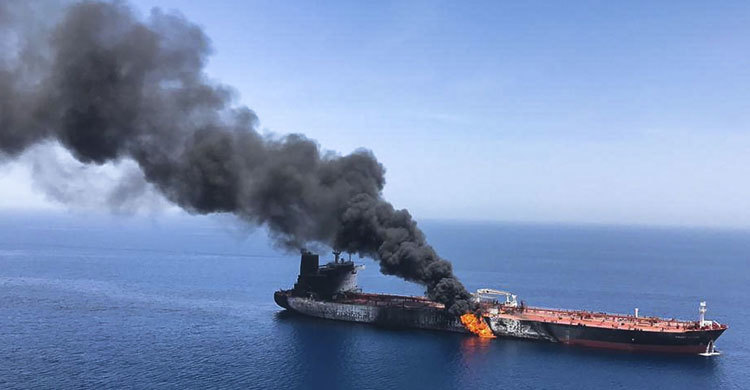Saudi Arabia blames tanker attacks on rival Iran

Saudi Arabia has blamed its rival Iran for the recent attacks on oil tankers along a key shipping route in the Gulf, reports BBC.
Saudi Crown Prince Mohammed bin Salman says his country "won't hesitate" to tackle any threats, as tensions continue to rise in the region.
On Thursday, two tankers were attacked in the Gulf of Oman, a month after four others were targeted off the coast of the United Arab Emirates.
The US has also blamed the attacks on Iran, which denies any involvement.
"We do not want a war in the region... but we won't hesitate to deal with any threat to our people, our sovereignty, our territorial integrity and our vital interests," Prince bin Salman told the pan-Arab daily newspaper Asharq al-Awsat.
"The Iranian regime did not respect the Japanese prime minister's visit to Tehran," he added. "While he was there [it] replied to his efforts by attacking two tankers, one of which was Japanese."
Saudi Energy Minister Khalid al-Falih earlier called for a "swift and decisive" response to the attacks.
On Saturday, the head of the world's biggest international shipping association said some firms have ordered their ships not to enter the Strait of Hormuz and the Gulf of Oman as a result of the attacks.
Jakob Larsen, head of maritime security at BIMCO, told the BBC military escorts for tankers could be organised if the situation worsened.
The US has produced a video it suggests shows Iranian forces in a small boat taking an unexploded mine off the hull of one of the ships following Thursday's attacks. But it has not provided evidence for Iran's alleged involvement in the previous attacks within UAE territorial waters.
Relations between the US and Iran have deteriorated significantly since US President Donald Trump took office in 2017. He abandoned a nuclear deal and significantly tightened sanctions on Iran.
The UK has said responsibility for Thursday's attacks "almost certainly" lies with Iran.
It repudiated Iran's assertion that Tehran formally summoned the UK ambassador to complain about London's reaction.
However, a UK Foreign Office official said the ambassador did meet a senior Iranian to discuss the issue.
Iranian media said the official told the ambassador that Iran strongly condemned Britain for echoing the US in holding it to blame for the attacks.
What we know about Thursday's explosions
According to the US account of events, US naval forces in the region received distress calls from the Norwegian-owned Front Altair at 06:12 (02:12 GMT) and from the Japanese-owned Kokuka Courageous at 07:00, following explosions, and moved towards the area.
It said the USS Bainbridge observed Iranian naval boats operating in the area in the hours after the explosions, and later removing the unexploded mine from the side of the Kokuka Courageous.
The crews of both vessels were evacuated to other ships nearby. Both Iran and the US later released pictures showing rescued crew members on board their vessels.
BSM Ship Management, which manages the Kokuka Courageous, said the ship's crew abandoned ship after observing a fire and an unexploded mine.
However Yutaka Katada, the president of the ship's operator, Kokuka Sangyo, said members of the crew had reported "that the ship was attacked by a flying object".
The Kokuka Courageous was about 30km (20 miles) off the Iranian coast when it sent its emergency call.
The Front Altair was carrying naphtha, a petrol product, from the United Arab Emirates to Taiwan. The Kokuka Courageous was carrying methanol from Saudi Arabia to Singapore.
According to global satellite monitoring company Iceye, the damage to the Front Altair caused some oil spill in the waters around the ship.
Front Altair crew members landed in Dubai on Saturday after two days in Iran.
Why are US-Iran tensions so high?
In 2018, the US pulled out of the landmark nuclear deal reached in 2015 that was aimed at curbing Iran's nuclear activities. The move was strongly criticised by a number of countries, including the closest allies of the US.
In May, President Trump tightened US sanctions on Iran - mainly targeting its oil sector. Iran then announced it would suspend some commitments under the nuclear deal.
In recent months, the US has strengthened its forces in the Gulf - saying there was a danger of Iranian attacks. It sent an aircraft carrier strike group and B-52 bombers to the region.
In response, Iran accused the US of aggressive behaviour. Those tensions rose markedly after the 12 May limpet mine attacks in the UAE.
The UAE blamed an unnamed "state actor". The US said that actor was Iran, an accusation Tehran denied.
While it is unclear why Iran would carry out a relatively low-level attack on the multinational tankers, observers have speculated that it could have been to send a signal to forces ranged against it that it is capable of disrupting shipping there without triggering a war.



